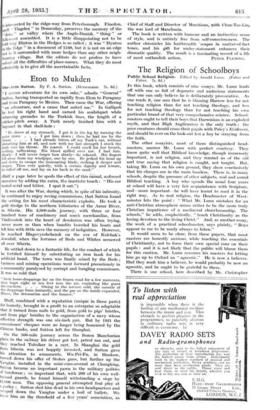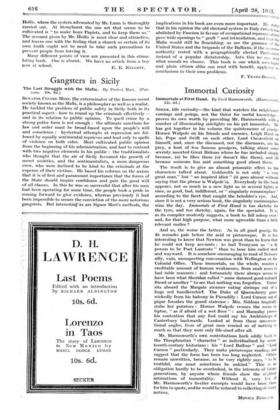The Religion of Schoolboys
Public School Religion. Edited by Arnold Lunn. (Faber and Faber. 7s. 6d.) IN this book, which consists of nine essays, Mr. Lunn leads off with one so full of dogmatic and audacious statements that one can only believe he is deliberately provocative. As one reads it, one sees that he is blaming Harrow less for not teaching religion than for not teaching theology, and less for not teaching theology than for not teaching his own particular brand of that very comprehensive science. School- masters ought to tell their boys that Darwinism is an exploded myth, and that High Anglicanism is the only truth ; the poor creatures should cram their pupils with Paley's Evidences, and should be ever on the look-out lest a boy be straying front the faith.
The other essayists, most of them distinguished head- masters, answer Mr. Lunn with perfect courtesy. They know quite well that Biblical knowledge, though immensely important, is not religion, and they remind us of the old and true saying that religion is caught, not taught. But, taking Mr. Lunn on his own ground; they show conclusively that his charges are in the main baseless. There is, in many schools, despite the pressure of other subjects, real and sound Biblical teaching. A boy who spends the usual four years at 'school will have a very fair acquaintance with Scripture, and—more important—he will have learnt to read it in the right way. As to real religion, the Headmaster of West- minster hits the point : " What Mr. Lunn mistakes for an anti-Christian atmosphere seems rather to be the more truly Christian impatience of a mediaeval churchmanship. The schools," he adds, emphatically, " teach Christianity as the loving devotion to the living Christ." And, as another essay, the work of a practical schoolmaster, says plainly, " Boys appear to me to be ready always to listen."
It would seem to be clear, from these papers, that most masters are honestly anxious, while teaching the essentials of Christianity, not to force their own special inns on their pupils : and it is not likely that the public will blame them for this caution. Mr. Lunn censures his masters for letting him go up to Oxford an " agnostic." He is now a believer. Had they made him a believer, he would probably be now an agnostic, and he ought to be grateful to them.
There is one school, here described by Mr. Christopher Hollis, where the system advocated by Mr. Lunn is thoroughly carried out. At Stonyhurst the one art that seems to be cultivated is " to make boys Papists, and to keep them so." The account given by Mr. Hollis is most clear and attractive, and leaves one with the feeling that a church so certain of its own truth ought not to need to take such precautions to prevent people from leaving it.
Many different points of view are presented in this stimu- lating book. One is absent. We have no article from a boy







































 Previous page
Previous page